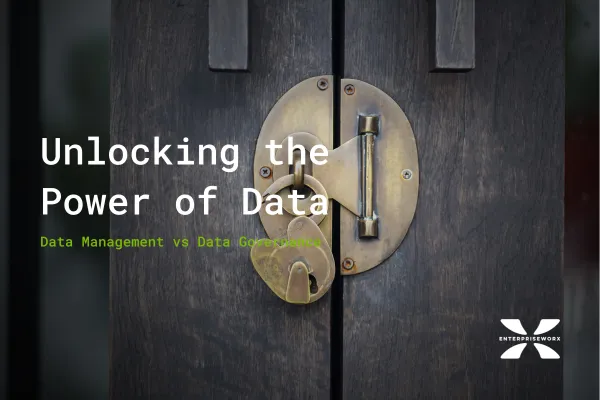ENTERPRISEWORX BLOG

Unlocking the power of data: Data Management vs Data Governance
Data is more valuable than ever. Organisations of all sizes collect, store, and analyse data to gain insights to help them make better decisions and drive business growth. However, as the volume of data grows, so does the complexity of managing it, and this is where data management and data governance come into play.
Data management is the process of collecting, storing, and retrieving data, and it encompasses various activities, from data entry to data quality control. On the other hand, data governance refers to the policies, procedures, and standards you use to manage your data assets. It ensures that data is appropriately collected, secured, and used to align with your goals and objectives.
We will explore the differences between data management and governance and why they are essential for successfully leveraging data.
Data Management
Data management refers to collecting, storing, and retrieving data, and it is the foundation of any data-driven organisation. Proper data management lets you make informed decisions and gain valuable insights from your data.
Data management includes several vital activities:
Data collection: Collecting data from various sources and ensuring that it is accurate and complete.
Data storage: Storing data in a way that is secure and easily accessible.
Data processing: Processing data to make it worthwhile for analysis and decision-making.
Data analysis: Analysing data to gain insights and identify trends.
Data dissemination: Sharing data with stakeholders in a meaningful and valuable way.
Effective data management requires a structured approach. You must clearly understand the data you collect, where it comes from, and how you will use it. Having the right tools and technologies to manage your data effectively would be best.
Data Governance
Data governance refers to an organisation's policies, procedures, and standards to manage its data assets. It is a strategic approach to data management that ensures that data is appropriately collected, secured, and used to align with your goals and objectives.
Data governance includes several vital activities:
Data quality management: Ensuring data is accurate, complete, and consistent.
Data security management: Ensuring data is secure and protected from unauthorised access.
Data privacy management: Ensuring that data is being used in a way compliant with privacy regulations.
Data lifecycle management: Managing data throughout its lifecycle, from creation to deletion.
Data ownership management: Identifying who owns the data and ensuring who is responsible for its management.
Effective data governance requires a structured approach. You must clearly understand your data governance framework, including policies, procedures, and standards. You also need to have the right tools and technologies in place to support your data governance efforts.
Data Management vs Data Governance
While data management and governance are closely related, the two have some key differences.
Data management focuses on the technical aspects of managing data, such as data entry, storage, and retrieval. It ensures that data is accurate, complete, and easily accessible. On the other hand, data governance focuses on the strategic aspects of managing data, such as data quality, security, and privacy. It is concerned with ensuring that data aligns with your goals and objectives.
Another difference between data management and data governance is your scope. Data management is focused on managing individual data sets, while data governance focuses on managing data as an enterprise asset. Data governance takes a holistic approach to managing data, considering how it fits into your overall strategy and operations.
How does effective data management contribute to successful data governance in an organisation?
Effective data management is crucial to successful data governance in any organisation. Data management involves collecting, storing, processing, analysing, and disseminating data, while data governance involves establishing policies, procedures, and standards to manage and protect data assets.
Without effective data management practices, data governance efforts are likely to fall short. Data management provides the foundation for data governance by ensuring that data is accurate, complete, consistent, and easily accessible. If data is not properly managed, it can lead to inaccurate or incomplete analysis, which can, in turn, lead to poor decision-making.
Effective data management practices can contribute to successful data governance in several ways:
Data quality: Effective data management practices ensure that data is accurate, complete, and consistent. This is essential for data governance, as it helps to ensure that decisions are based on reliable information.
Data security: Effective data management practices also ensure that data is secure and protected from unauthorised access. This is a critical aspect of data governance, as it helps to protect sensitive information and prevent data breaches.
Data privacy: Effective data management practices also ensure that data is used in a way compliant with privacy regulations. This is important for data governance, as it helps to protect individual privacy rights and maintains customer trust.
Data transparency: Effective data management practices also promote data transparency, which is important for data governance. Transparency helps build trust with stakeholders and enables you to demonstrate compliance with regulations and best practices.
Overall, effective data management practices are essential for successful data governance. Establishing a strong data management foundation ensures that your data governance efforts are effective and aligned with your overall business objectives.
How can you leverage technology to improve your data management and governance practices?
You generate and collect vast amounts of data daily. Managing and governing this data can be challenging, but technology can help you streamline your data management and governance practices. Here are some ways that you can leverage technology to improve your data management and data governance practices:
Data Management Systems: Data management systems such as databases, data warehouses, and data lakes can help you to store, process, and manage your data effectively. These systems can provide advanced data processing and storage capabilities, making it easier for you to manage your data efficiently.
Data Analytics Tools: Advanced data analytics tools such as business intelligence and data visualisation software can help you to gain insights from your data. These tools can help you to understand your data better and make informed decisions based on insights.
Machine Learning and Artificial Intelligence: Machine learning and artificial intelligence technologies can automate and optimise data management and governance processes. These technologies can help you to identify patterns, predict future trends, and automate routine tasks.
Data Governance Software: Data governance software can help you to establish and enforce data governance policies and standards. These tools can help you to track data lineage, manage data quality, and monitor compliance with regulations and best practices.
Technology can be a powerful tool for improving your data management and governance practices. By leveraging the right technology solutions, you can streamline your processes, improve data quality and accuracy, ensure data privacy and security, and enhance your decision-making capabilities.
Effective data management and governance practices are crucial to remaining competitive and compliant. By leveraging technology solutions such as data management systems, analytics tools, and machine learning, you can improve your data management and governance practices, leading to better decision-making, improved operational efficiency, and enhanced compliance.
However, implementing effective data management and governance practices requires your commitment and investment. You need to understand the importance of data management and governance and its impact on your business's success. You must allocate resources and budget to invest in the right technology solutions and hire skilled personnel to manage and govern your data effectively.
Therefore, we urge you to act and prioritise your data management and governance practices. We can assess your current data management and governance practices, identify gaps and areas for improvement, and develop a roadmap for implementing effective solutions. We will ensure that your data management and governance practices align with your business objectives and comply with regulatory and ethical requirements.
By investing in effective data management and governance practices, you can unlock the full potential of your data and gain a competitive advantage in your industries. You can improve customer experience, increase operational efficiency, and reduce risks associated with data breaches and non-compliance.
In conclusion, we call upon you to take action today and invest in effective data management and governance practices. Leverage technology solutions and best practices to manage and govern your data effectively, leading to improved business outcomes and a better future for all.
At EnterpriseWorx, we understand the importance of data management and governance and its impact on business success. As data-to-decisions partners, we can guide you on the full road from data management to business intelligence. Our team of experts can help you assess your current data management and governance practices, identify gaps and areas for improvement, and develop a roadmap for implementing effective solutions.
Contact us today at www.ewx.co.za or email info@ewx.co.za to learn how we can help you improve your data management and governance practices and gain a competitive advantage in your industry.

ABOUT
+27 11 301 0900
South Africa
01 Sturdee Avenue
Rosebank, JHB, 2196
United Kingdom
1 Moorfield Close,
Moorfield Business Park, Leeds, LS 197YA
Copyright 2003-2023 EnterpriseWorx IT (PTY)LTD